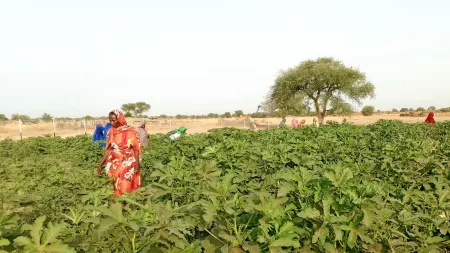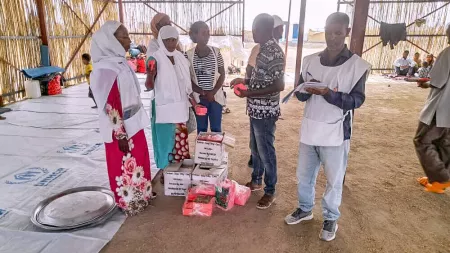In advance of the Sudan pledging conference that will be held on Monday 19th June, CARE International asks for the United Nations appeal to be fully funded, to help save the lives of millions of vulnerable people affected by the ongoing conflict.
“This is a crisis of an unprecedented scale for Sudan, and donors must act now to avert an even bigger humanitarian catastrophe”, said Arthur Molenaar, CARE Deputy Country Director for Sudan. “Urgent assistance is required to feed malnourished children, restore critical emergency and maternity care, and support neighboring countries who have opened their borders to Sudanese civilians fleeing for their lives. We are particularly concerned that most of those who are being displaced by the fighting are women and children who are highly vulnerable, including to gender-based violence."
Basic systems collapsing
According to the United Nations, over half of Sudan’s population is now in need of assistance. This represents a 57% increase since the start of the crisis in mid-April. Prices of food, fuel, and other basic goods are skyrocketing, making critical goods unaffordable for many people. Rates of malnutrition are increasing, especially among children. The World Food Programme expects over 19 million people – out of a population of just under 46 million – to be acutely food insecure in the next two to five months if the conflict persists.
This is Sudan’s main planting season. Without critical support to small-holder farmers now, Sudan faces the prospect of even more people going hungry later into this and next year. In a country where sexual and gender-based violence (GBV) was already a grave concern, the conflict has further increased the risks, while at the same time severely limiting access to lifesaving GBV services.

Healthcare is close to collapse, threatening safe deliveries for over 200,000 pregnant women in the capital Khartoum alone. The Sudan Doctors Trade Union estimates that two-thirds of hospitals located near conflict areas are out of service.
Even before this latest crisis, Sudan was facing widespread food insecurity and large numbers of internally displaced people. Since the onset of the crisis, well over 1.8 million people have been newly displaced, including over 467,000 who have sought refuge in Chad, Egypt, South Sudan, and the Central African Republic. This has an impact on the regional dynamics as countries such as Chad and South Sudan are amongst the poorest on the continent and will need support as they host those fleeing the conflict. However, the humanitarian response plans in these countries have been chronically underfunded for the past years, including in 2023.
While money is crucial, more is needed to stop the devastation inflicted upon millions of innocent people,said Mr. Molenaar.
“We call for the international community to exercise its influence with the parties to the conflict to ensure respect for civilians and allow humanitarian workers to access all those in need, as mandated by international humanitarian law”, urges Molenaar.
According to the Sudanese Ministry of Health, at least 780 people have been killed and about 5,800 injured across the country. At least 18 health and humanitarian workers have lost their lives, humanitarian premises have been attacked and looted, and the World Health Organization has verified 46 attacks on healthcare workers and facilities as of 2nd June 2023.
For media inquiries, please contact: David Mutua, CARE East, Central, & Southern Africa Regional Communications Advisor via: [email protected].
Notes to editors
-
CARE has been operating in Sudan since 1979, implementing humanitarian and development programs focused on women’s and girls’ empowerment, gender justice, humanitarian action, and resiliency. The majority of our programming is ongoing.
-
CARE Sudan has reached over 200,000 people since mid-April.
-
In East Darfur and South Darfur, CARE provides clean drinking water to thousands of refugees and host communities where power outages and lack of fuel put pressure on water resources.
-
CARE runs over 40 health facilities in 5 states in Sudan, providing life-saving health and nutrition services to thousands of people every day.
-
In Gadarif, CARE supports water and sanitation services for thousands of Ethiopian refugees.
-
CARE has also offices in Kassala and South Kordofan.
